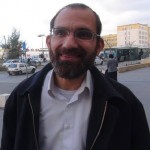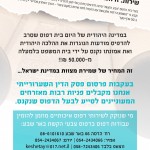Thursday, July 9, 2020, 12:16 Honenu Attorney Menashe Yado filed a complaint with the Israeli Police Legal Advisor over violations by policemen of fundamental rights of opponents to the Pride March. Among the violations, the police detained citizens for interrogation even though there was no clear indication that they intended to carry out a crime, trampled on the freedoms of protest and expression of the public who opposed the march, implemented over-policing and also violated detention conditions. In addition to the complaint, a civil suit was filed over the police conduct.
In the complaint, Yado states that the police strictly keep the area surrounding the Pride March sterile, and do not allow legal protest against it. “People marked as dangerous are liable to be detained anywhere in the area surrounding Jerusalem and to suffer harassment by the police, which is not comparable to police conduct concerning any other matter. The conduct of the Israeli Police concerning this matter violates democratic principles and restricts the rights of individuals.”
Among the examples in the complaint are instances of the police detaining certain individuals every year only because they are marked as dangerous to the Pride March. One of them is Y., a young man whose personal details and photograph appear in a police booklet titled “Pride March Jerusalem Area 2017”.
Every year prior to the Pride March, policemen either visit him at his home or speak to him on the phone to give him a warning. The policemen threaten him and make baseless demands on him, telling him that he should not come to the Pride March. Yado stated that the Israeli Police are not supposed to make threats in this matter: “Whatever is permitted, is permitted, and whatever is prohibited, is prohibited. They are not allowed to verbally pressure anyone.”
This year Y. came to Jerusalem with his fiance to buy a tallit and an engagement ring. They were not aware that the Pride March was taking place. As they were strolling on Monbaz Street, policemen approached them and asked Y. to identify himself. The policemen then took Y. and his fiance into the police station. Y. was held for many hours and released late at night.
Additionally, Yado related to the fact that opponents of the Pride March are deprived of the freedom to protest. The areas outside of the “sterile zone” are supposed to be permitted for protest, however in reality “a hareidi Jew or a youth with a ‘settler look’ who approaches [the sterile zone] or waves a sign, will be detained and held at the police station until the Pride March is over.”
Yado stated that there should be areas designated for protesters outside of the sterile zone and addressed the murder of Shira Banki, z”l, who was stabbed to death while marching in the 2015 Jerusalem Pride March. The murderer had recently been released from prison after serving ten years for stabbing participants in the 2005 Jerusalem Pride March. “[The murder] was committed by a murderer with a history who came out of prison and announced to the media that he intended to ‘finish the job’, and despite that, for an inexplicable reason he was not under guard. One must not generalize based on his actions. Preventing the next failure [to stop a criminal act] must be done without tarnishing the name of the opponents to the Pride March.”
Yado further complains of over-policing and illegal detentions. Four young men were detained for interrogation at the Hizme Checkpoint, before they had left the Binyamin Region and entered Jerusalem. After several hours at the police station they were all released, and two of them had not been interrogated at all.
Yado is of the opinion that the actual purpose of the detention was to keep the detainees at the station so that they could not cause trouble in Jerusalem. “There is no procedure of this type in Israeli law. The police are illegally carrying out detentions.”
In the conclusion of the complaint, Yado explained that, “The issues are linked. There is no doubt that allocating suitable areas for protest while issuing administrative distancing orders will reduce the danger of unregulated protest, which is liable to turn violent, and will reduce the illegal and reprehensible use by the police of detentions. Thus the violation of individuals’ rights to the freedoms of expression and protest, will be significantly reduced concerning a topic which is at the heart of a sensitive social dispute.
“At the last Pride March the Israeli Police continued their heavy-handed law enforcement against the opponents. The enforcement violates not only the freedoms of expression, protest and assembly, but also human rights, such as the right to liberty. The violations are expressed in illegal detentions and denying the right to effectively demonstrate and protest against the march. In light of this, we filed a complaint with the Police Legal Advisor demanding that the enforcement policy be changed and balanced to allow effective protest against the Pride March, to cancel the false detentions and to allow preliminary discussions in accepted administrative procedures opposing the sweeping distancing orders served to opponents. Moreover, we are filing civil suits simultaneous to the administrative complaint to the police in order to prove to the court the justice of our claims.”
See here for a case of six right-wing activists who were brutally detained while protesting the 2019 Jerusalem Pride March and are suing the police for false detention and severe violation of their freedoms of expression and protest, and here for a case of printing house owners who appealed to the Be’er Sheva District Court regarding a ruling which obligates them to compensate Israel’s LGBT Task Force over refusal to print material which violates the owners’ beliefs.


